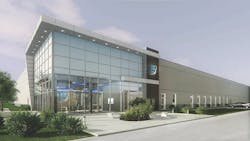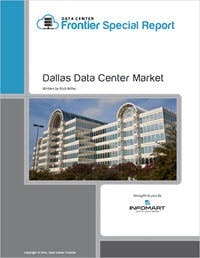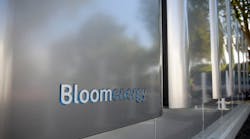DALLAS – The Dallas region has become one of the nation’s busiest data center markets, with strong leasing and a surge in new construction, including a huge new project in Forth Worth. As more data center users are attracted to Dallas, the local data center market is spreading out, with recent development focusing on northern suburbs like Plano, Garland and Allen.
“We keep pressing further north,” said Anthony Bolner, Executive Vice President and Partner at Stream Data Centers. “Our industry has moved to 50 to 100-acre campuses. We’re all fighting the battle of scale. As campuses get larger and larger, we all want to have capacity. We have land where we can grow.”
The Dallas market was the focus of several sessions at the recent DCD Colo + Cloud conference at the Dallas Fairmont. Executives say the Dallas market is in a major growth phase, with strong demand and a wave of new supply coming into the market. The arrival of Facebook in nearby Fort Worth has raised the region’s prospects as a potential destination for hyperscale projects, but market watchers say Dallas will continue to thrive based on local demand, with or without hyperscale deals.
In coming weeks we’ll be profiling some of the new data center projects in the Dallas area. But first let’s look at the strategic importance of Dallas/Fort Worth within the national data center landscape.
Business Climate Driving Growth
Already one of the largest and most active data center markets in the United States, Dallas benefits from a confluence of site selection merits: excellent power and fiber infrastructure, competitive economic incentives and robust competition among service providers.
Data Center Frontier Special Report: The Dallas Data Center Market. Download It Now.
Dallas is notable for the diversity of its data center ecosystem, with strong demand for retail colocation, wholesale data center space, powered shell and build-to-suit projects. The market is boosted by its location in the center of the country, and sees demand for space from multiple business verticals, including hosting and cloud players as well as enterprise customers in finance and energy. It also has its own power grid, known as ERCOT, which is attractive to firms wary about rippling outages on larger regional utility grids.
The Dallas/Fort Worth region is poised for a data center building boom, according to a recent market report from DCF and datacenterHawk, with more than 200 megawatts of potential capacity in the pipeline.
“In the last few years we’ve seen historic growth in the Dallas market,” said Bryan Loewen, Executive Managing Director of the Data Center Consulting Group at Newmark Knight Frank. “It’s tied to the Texas business environment and its growth. It’s not the lowest cost market, but it has a strong business environment.”
“We have every business vertical represented in the Dallas market,” said John Greenwood, Executive VP of Sales at at Aligned Data Centers, which operates in Plano. “It also makes it a competitive market.”
“I’ve always liked the Dallas market,” said Chris Crosby, CEO of Compass Datacenters, which has a campus in Allen. “I think it has the most robust demand. You get a wide variety of companies, both with disaster recovery and primary data centers. I see it as a great centralized hub.”
Dallas is often seen as competing with Chicago as companies make decisions about where to place IT workloads in the Central U.S. That’s no longer a binary choice, as cloud builders are deploying huge hyperscale campuses across Iowa, Nebraska and Iowa. Dallas also competes for deals with other markets in the state, including San Antonio, Houston and Austin.
“Dallas has been the best point for data centers on the ERCOT grid,” noted Loewen. “There’s no hurricanes or earthquakes here.” The flooding from Hurricane Harvey could lead some companies to favor Dallas over Houston, even though no major Houston data centers experienced downtime. That doesn’t mean there aren’t disaster threats in Dallas, as the region experiences tornadoes, which is why reinforced roofs are a key feature of many facilities here.
Development Shifts to Northern Suburbs
The Dallas area is home to more than 2.5 million square feet (SF) of commissioned data center space, representing 278 megawatts (MW) of commissioned power, according to market research from datacenterHawk. That makes Dallas the third-largest market for data center space in the U.S., trailing only Northern Virginia and Silicon Valley.
The early growth of DFW’s data center market was focused in downtown Dallas. Because the central business district is rich in telecommunication infrastructure, including the Dallas Infomart on Stemmons Freeway and Digital Realty’s buildings at 2323 Bryan Street and the DataBank (400 South Akard). These multi-tenant buildings typically attract colocation customers.
The region’s data center capacity is spread across several sub-markets, including major carrier hotels in downtown Dallas, a cluster of facilities near Love Field to the West, a nexus of wholesale data centers in the “Telecom Corridor” in Richardson, and emerging markets further north in Plano, Garland and Allen.
The exterior of the RagingWire TX1 data center in Garland, the first of a planned five buildings. (Photo: RagingWire)
These northern suburbs are emerging as key to the region’s data center supply, offering more land for the multi-building campuses that developers covet.
“We have to make sure our customers could grow for 10 years, and that’s a long roadmap,” said Rob Morris, Managing Partner at Skybox Data Centers, which has a new data center in Plano. “Not long ago, you could rattle of of a lengthy list of good data center locations in Dallas. That’s not the case anymore. In Plano, you’re actually working against office developers. It’s a land grab. It’s interesting to see how this market spreads its wings.”
“If you don’t have capacity, you don’t get a lot of looks,” said Loewen. “Dallas/Fort Worth is seeing a lot of inventory coming online in 2017-2018, but we missed a lot of deals in 2017 because we didn’t have inventory in Dallas. If you don’t have product in the ground and ready to be turned around quick, you can miss out.”
Plano has been the focus of recent development, and is home to new facilities for Aligned, Equinix and Ascent as well as Skybox. Several miles to the east, RagingWire Data Centers has deployed the first building on a 1 million square foot new campus in Garland, where Digital Realty has just purchased land across the street for a $1 billion data center campus. To the north of Plano, Compass has a campus in Allen. It will soon have new neighbors in CyrusOne, which has bought 65 acres for a 1.4 million square foot campus.
Is Dallas Ready for Hyperscale?
Yes, the data center projects are big in Texas. The latest example is found in Fort Worth, about 30 miles west of Dallas. Facebook made headlines last year when it began work on a five-building campus near Alliance Airport that will be its largest cloud campus yet. It’s the first real single-tenant hyperscale project in the Dallas market, and a veteran data center developer believes it won’t be the last.
Last week T5 Data Centers announced plans for a 400-megawatt project on land just north of the Facebook site. T5@Alliance is being created by T5 and IPI Data Center Partners, an investment fund backed by the deep pockets of Silicon Valley wealth management firm Iconiq and Iron Point Partners. The project will occupy at least 350 acres within the AllianceTexas business park operated by Hillwood and the Perot family.
“Cloud and hyperscale data center users are looking for locations that can offer a growth pathway, incentives, resiliency and speed to operation, all with low costs,” said Pete Marin, President and CEO of T5, who said Fort Worth “offers a perfect combination of these critical requirements. This partnership with Hillwood and IPI Partners brings together a highly experienced team ready to deliver hyperscale campuses for discerning data center customers.”
Even before T5 and IPI announced their new campus, the DCD event featured debate over whether Dallas will emerge as a hyperscale market. Northern Virginia and Chicago have become active destinations for huge cloud server farms, powering dynamic growth in both markets. Digital Realty has leased entire buildings to service providers on its Richardson campus, and QTS has signed several 4 megawatt deals at its site in Irving.
“I think Dallas is poised to be a great hyperscale market, but it’s not today,” said Bolner. “There are large deals out there saying ‘I want space ready in three to four months.’ We’ve got a lot of things working for us here in Texas, but our incentives are not as good as Northern Virginia or other markets.”
Sometimes, the most important competition is elsewhere in Texas.
“If Microsoft had set up its primary Texas market in Dallas rather than San Antonio, this would be a different market,” noted Morris. “Those deals move markets. We haven’t seen it yet. I think it’s a matter of when, not if.”
And for further coverage, check out Data Center Frontier’s page dedicated to the Dallas Data Center Market, that will provide the latest stats and info on this quickly growing area that is continuing to experience a data center boom.
About the Author



